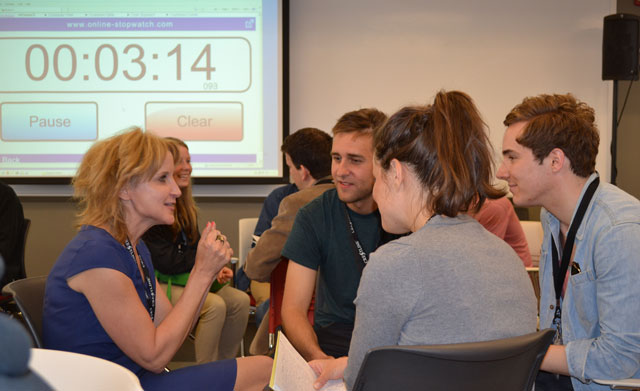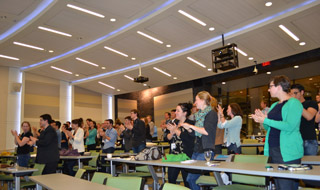The last two days of the Leading the Way Youth Summit
The last two days of the Leading the Way Youth Summit

Wow, the last two days of the summit were a world wind! I really can’t believe the weekend is already over. The summit started last Friday and ran until Sunday night. An unbelievable amount of organization and work was packed into structured 14-hour days and late night conversations.
After the settling in and housekeeping of Day 1, Day 2 was jammed packed with all types of activities.
Following an early morning breakfast at 8am, the delegates were loaded onto a chartered Calgary Transit bus and taken on a tour of the city’s transit-oriented communities. Then, promptly at 10:30am, the group unloaded the bus and walked into a professional development session at the downtown campus of the University of Calgary.
Dubbed “Speed Networking and Sponsored Speeches”, the idea was to use a speed-dating model for young delegates to meet professionals who work for either a transit authority or private companies with some connection to transit or environmental initiatives. Delegates were given five minutes with each professional before a bell was rung, and they had to move onto speaking with the next professional. Sitting in on a few of these speed meetings, I found the concept to be a truly one-of-a-kind experience. The opportunity to have access to this many professionals in such an informal environment was truly unique.
Saturday afternoon was filled with a lunch/career fair and a workshop about partnering with business and working with stakeholders.
After a 15-minutes break to catch their breaths, the delegates met with their CUTA 2013 Workshop partners to frantically work on their pitches for their transportation project. As mentioned in my last post, the winning pitch would receive $5000 to kickstart their idea.

After dinner, the delegates where taken to the guts of Calgary Transit’s LRT (Light Rapid Transit) system, known as the Oliver Bowen LRT Maintenance Facility, for a technical tour. Afterwards, they were whisked away onto a private non-stop, three-car DJ party train! Yup, complete with streamers, dimed lights and thumping tunes, delegates got a chance to unwind, get to know each other better and get a free and unique tour of the system’s newest line out to North West Calgary.
It was another early start for delegates on Sunday. They were given the choice to attend two of the following four sessions of speakers followed by a question and answer period: Transit and Accessibility, Transit Planning in Small and Large Communities, Transit and the Aging Population, and Linking Active Transportation and Transit.
There was a short break for lunch, then two more sessions for delegates to choose from: Carsharing – A Key for Sustainable Transportation or Media & Communications. I was one of the speakers at the latter session along with Matthew Blackett, Publisher and Creative Director of Spacing Magazine, and Tony Seskus, Assignment Editor of the Calgary Herald.
Matthew had some great insights into how technology can really get people involved in the dialogue of public transit. Tony had some indispensable advice on how you can get the media to cover your story, cause or event.
My chat was about TransLink’s history in social media and how we can continue to connect with our online audiences in the future. I had a great time answering some very insightful questions in the Q & A period.
The summit ended off with the fruits of the hard work of delegates’s group work. For a two-hour period, each of the nine CUTA 2013 workshop groups presented their pitches to an expert panel.

Mimicking the Lion’s Den TV program, delegates had five minutes to convince the panel that their ideas were the most worthy for the $5000 kickstart prize.There were some fantastic and creative ideas, especially considering that these groups of delegates had never worked together before and had only a few hours to come up with their ideas, make digital or analogue presentation aids, then pitch them with enthusiasm.
The prize went to a rewards program much like Air Miles, but for public transit. Instead of getting points when you buy gas for a private vehicle, with this group’s idea, a more sustainable choice like taking public transit would gain you points that could be redeemed for rewards instead. The pitch included a PowerPoint of images of a smart phone application called Green² where users would be able to track how many kilometers they travelled on public transit using GPS technology and be awarded points based on this distance.
I spoke with Alex from Ladner, BC, who was the main presenter for the group (and a very good one, I might add).
Why did you decide to apply to be a delegate for this year’s summit?
Alex: Someone told me about the conference. I’m really passionate about transit. I haven’t been involved in the working of it before, but I knew I wanted to be part of it. I had no idea that transit was so complex, such a hot topic and can be so leading-edge. It’s amazing how much work there is to do, how much potential there is, how much opportunity there is in the industry, and I can’t wait to get more involved!
This was probably the most eye-opening conference I’ve ever been to.
How old are you?
Alex: Nineteen.
Are you in school?
Alex: I just graduated from Delta Secondary in 2012. I go to Langara College and am studying computer science part-time. I’m going to BCIT next year to study computer information systems administration.
I saw an opportunity with all of the smart card systems on tying together all the data collection available and making it accessible to users, and that’s what I presented on today. There’s been reward programs for travelling and burning fossil fuels; however, there haven’t been any rewards programs for taking transit. If we can get people to see the value of taking transit and make the data available by using more smart cards, we can really give people a picture of what they do on transit, the role that they play and reward them for it.
What were your thoughts about the summit before you came?
Alex: I thought it was going to be some dry lecture thing and not as interactive as it turned out to be. I’ve had some amazing experiences here.
Now that the summit is over, what are your thoughts?
Alex: I can’t wait to get started. I’m probably going to be doing an urban planning degree at some point in the future. I’m so looking forward to getting involved in the industry. If I can tie in IT and transit, that’s my dream job.
If you have any interest in public transit, apply to go to this summit. It’s a great experience. I highly recommend it. I give this summit an 11 out of 10. It was awesome!
Alex’s enthusiasm for the weekend was mirrored in the hollers and cheers of the entire delegate group, organizers, speakers, facilitators and volunteers during the closing remarks by David Cooper, a Senior Transit planner with Calgary Transit and chief summit organizer, Sunday night.
Now that this year’s Western Youth CUTA summit has come to a close, plans will need to be made for the next summit in 2015, which will be held in either Edmonton, Winnipeg or Vancouver.






This piece of writing will help the internet people for setting up new website or even
a weblog from start to end.